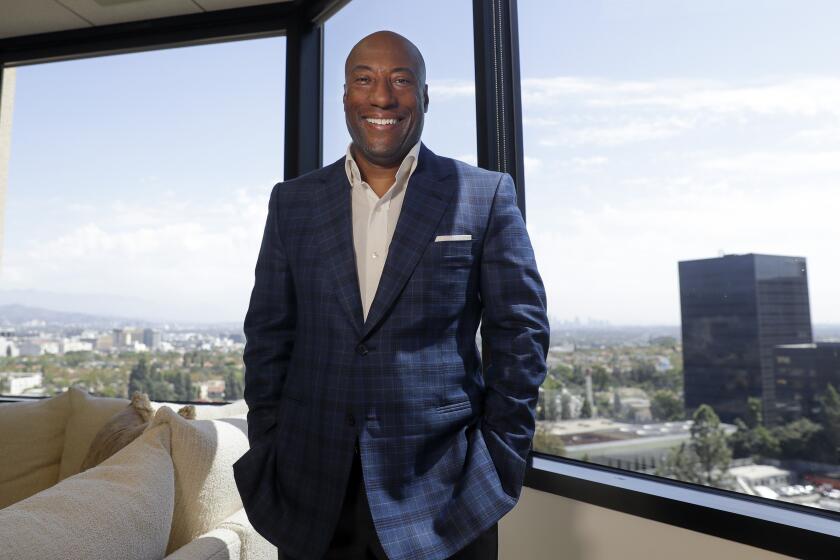Disney Team Was Example of Rare Stability
- Share via
Before the tragic death of Walt Disney Co. President Frank G. Wells on Sunday, Hollywood seemed to be enjoying a rare period of calm. For the first time in recent memory, all of the major entertainment companies had their executive houses in order, at least temporarily.
Robert Daly and Terry Semel agreed to share power as co-chairmen at Warner Bros., Tom Pollock extended his contract as MCA movie chief, Sherry Lansing and Kerry McCluggage were reaffirmed as division chiefs by Paramount’s new owners and Peter Chernin settled into his chairman’s job at 20th Century Fox. Even Sony Pictures, known as management upheaval central, was recovering from the defection of movie group president Jonathan Dolgen.
That kind of quietude is increasingly rare in Hollywood, even though it pays serious lip service to the value of stability in deference to Wall Street and the creative community.
Wells was one exception. In his decade-long career at Disney, the 62-year-old executive helped create one of the all-time corporate successes in partnership with Chairman Michael D. Eisner. The company’s value rose more than tenfold, from $2 billion to $22 billion. But Disney executives also had a rare personal unity. In the wake of Wells’ death, even those close to the company had trouble delineating who did what.
Wells was also one of Hollywood’s best-liked executives. News of his death on Monday brought an unusual outpouring of grief. Many in Hollywood saw a direct correlation between the kind of management stability Wells brought to the company and its creative success.
MCA Chairman Lew R. Wasserman and President Sidney J. Sheinberg have the longest working relationship, at more than 30 years, although the company is now owned by Matsushita. Second place belongs to Warner Bros., where Daly and Semel have worked together for more than a decade. The premium that the two companies place on longevity was illustrated last week, when both made prominent announcements of executive-stabilizing moves within days of one another.
The Disney team had the third-longest marriage, before Wells’ untimely death. On Monday, the executive, who also served as chief operating officer of the company, was credited with playing a role in everything from television and feature film successes to the broad expansion of Disney’s theme park and retailing businesses. People close to the company predicted that Eisner will take his time replacing Wells, who was a close friend in addition to a business associate.
The remaining studios have tacitly acknowledged the benefits of stable management at one time or another, but without the same level of commitment.
Sony Pictures Entertainment Chairman Peter Guber is the next most senior executive, with five years experience. Sony Corp., the parent company, extended his contract in November, and Guber recently said that he intends to remain on the job.
*
But Guber’s efforts to project a stable image have been undercut by the departures of former co-chairman Jon Peters, former Columbia Pictures Chairman Frank Price, former TriStar Pictures Chairman Mike Medavoy and Dolgen, who shared responsibility for Columbia and TriStar.
Company sources say that a search is under way for a credible successor to Dolgen. They also say Sony’s revolving-door problems are over.
Day-to-day business is quieter at 20th Century Fox. Chernin is said to have the full confidence of owner Rupert Murdoch, who is filling the role played by former Fox Inc. Chairman Barry Diller.
While the film community is still getting to know Chernin, a former TV executive who was named to his post in late 1992, sources credit him with bringing a low-key, collegial style to Fox--which went through a succession of chairmen before him.
Chernin also gets high marks for recruiting former Disney executive Bill Mechanic as 20th Century Fox president.
A bigger question mark is Paramount. Film chief Lansing and TV head McCluggage seem to have the confidence of Dolgen, who was brought over to run entertainment by Viacom Inc. But rumors persist of lower-level changes at the studio, which has had three chairmen in four years.
Viacom Chairman Sumner Redstone is also expected to consolidate some operations, which could lead to other studio changes.
*
He’s got the power: Rack up another honor for super director-producer Steven Spielberg. Premiere magazine has named him the most powerful person in Hollywood on its Top 100 list.
Spielberg, whose name was No. 13 on last year’s list, was elevated in recognition of the runaway success of “Jurassic Park” and “Schindler’s List.” “Jurassic” has taken in nearly $1 billion worldwide; “Schindler’s” recently won the Academy Award for best picture--as had been expected.
Rounding out Premiere’s Top 5 are Warner Bros.’ Daly and Semel, Creative Artists Agency Chairman Michael S. Ovitz, Walt Disney Studios Chairman Jeffrey Katzenberg and MCA President Sheinberg.
Vice President Al Gore is ranked No. 100, in recognition of his influence in shaping communications technology policy.
Premiere also has a Top 10 category for “behind the curtain” players.
They are News Corp.’s Murdoch, Tele-Communications Inc. Chairman John Malone, Time Warner Chairman Gerald Levin, Disney’s Eisner, Viacom’s Redstone, Blockbuster Entertainment Chairman H. Wayne Huizenga, CNN founder Ted Turner, QVC Chairman Barry Diller, investment banker Herbert Allen Jr. and MCA Chairman Wasserman.
More to Read
The biggest entertainment stories
Get our big stories about Hollywood, film, television, music, arts, culture and more right in your inbox as soon as they publish.
You may occasionally receive promotional content from the Los Angeles Times.










